Monthly Archives: May 2023

The Visitation
I have been observing this cover of the Magnificat magazine for weeks during daily Mass. A devout woman who sits in front of me always lays it upon the empty chair next to her. It moved me deeply, insinuating a Spanish sensibility that drew me in. I expressed to her how much I enjoyed the image and she insisted I take the Magnificat with me and read about the cover. I did and was moved, feeling the need to share.
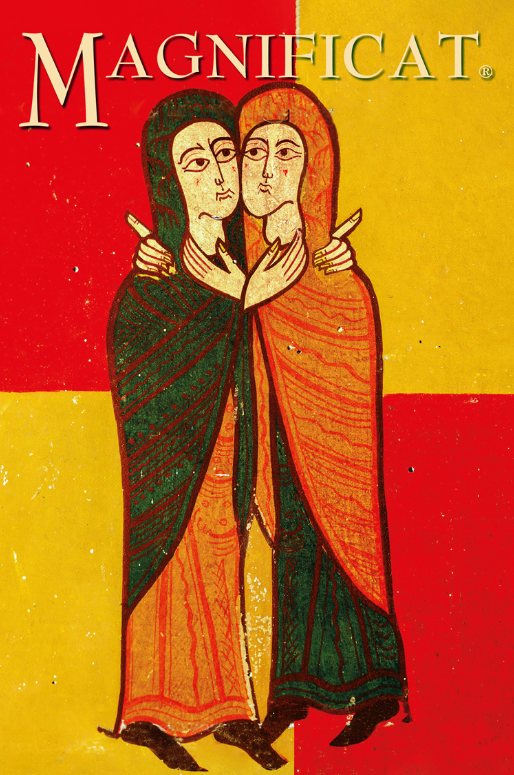
This work of art was produced in the late 12th century to decorate the frontispiece of the altar in a remote little mountain church on the borders of the Catalan Pyrenees (Spain), in San Andrés de Sagas. The anonymous artist painted it with distemper paint on a panel made of cherry wood. In order to paint with distemper, the artist began by preparing his different-colored pigments in the form of very fine powders. Then he coated the support with several successive layers of a sort of plaster. Next he “thinned” with water the pigments in the desired quantity so as to use them immediately, adding a sticky substance like starch. He then had to paint rapidly, indeed, with a very sure hand, because the prepared surface immediately absorbed the paint and dried quickly; this technique had a low tolerance for superimpositions or do-overs.
This Visitation dates from the very late 12th century, when Catalan Romanesque art, which at first had been influenced by the Byzantine-Lombard style, underwent an original development, ending (as we see here) in the inspired adoption of the “clear line.” This graphic language—which became necessary as early as the 11th century for the production of leaded stained-glass windows—would be adopted and theoretically defended in the mid-20th century by the ingenious Belgian cartoonist Hergé, the creator of Tintin, in response to the technical constraints imposed at the time by the process of printing comic strips in color. This language assumes that each element is delineated by a black line of constant thickness, forming a cell that is destined to receive a given color, without gradations of intensity or shading. This stroke, this clear line, bears the full responsibility not only for drawing the objects and situating them intelligibly, but also for expressing emotions, and finally for giving them the meaning (here, a theological one) that the artist intends to confer on the image he issues.
We see that here the artist more than adequately satisfied the specifications, with an ingenious economy of method: he went so far as to place the scene in a purely graphic setting so as to give the idea that it has at all times and in all places a universal and eschatological dimension—a meaning that transcends its anecdotal historicity. The moment of the image is the canticle of the Magnificat. Cheek to cheek, looking each other in the eyes, with their hands opened toward the Father in a unique gesture of praise that outlines the dove of the Holy Spirit, Mary and Elizabeth now form one body and one soul in their praise and thanksgiving. Elizabeth’s head, as though enlarged by contact with her cousin’s, testifies that she is the one who has just paid homage to Mary, “blessed among women.”
May this streamlined image inspire us with the holy humility that will enable us to believe the unthinkable: truly the Father wishes to make our lives into marvels, each according to his or her own vocation. And he wants to do this in a way not essentially unlike the way in which he worked marvels in the life of the Most Blessed Virgin Mary, enabling her to bring into the world, by the action of the Holy Spirit, the Love of God who is Jesus our Savior, the Son of God.
How could that happen for each of us? The Little Flower had indeed started to plumb this great mystery when she said to Jesus, in the form of a Magnificat: “Oh, Lord, it is because you wanted to give me this grace that you made your new commandment. Oh! how I love this new commandment since it gives me the assurance that your will is to love in me all those you command me to love!“ (Manuscript C). All that remains is for us, in a suitably childlike spirit, to take Saint John as our authority (1 Jn 4:12) and to dare to conclude: If we love one another as Jesus loved us, in this communion of the Holy Spirit, God dwells in us and in us his love reaches its perfection. –Pierre-Marie Dumont
The Prayer of Mary
My soul proclaims the greatness of the Lord,
my spirit rejoices in God my Savior
for he has looked with favor on his lowly servant.
From this day all generations will call me blessed:
the Almighty has done great things for me,
and holy is his Name.
He has mercy on those who fear him
in every generation.
He has shown the strength of his arm,
he has scattered the proud in their conceit.
He has cast down the mighty from their thrones,
and has lifted up the lowly.
He has filled the hungry with good things,
and the rich he has sent away empty.
He has come to the help of his servant Israel
for he remembered his promise of mercy,
the promise he made to our fathers,
to Abraham and his children forever.
(Lk 1: 46-55)
Magnificat anima mea Dominum;
Et exultavit spiritus meus in Deo salutari meo,
Quia respexit humilitatem ancillae suae; ecce enim ex hoc beatam me dicent omnes generationes.
Quia fecit mihi magna qui potens est, et sanctum nomen ejus, Et misericordia ejus a progenie in progenies timentibus eum.
Fecit potentiam brachio suo;
Dispersit superbos mente cordis sui.
Deposuit potentes de sede, et exaltavit humiles.
Esurientes implevit bonis, et divites dimisit inanes.
Sucepit Israel, puerum suum, recordatus misericordiae suae, Sicut locutus est ad patres nostros, Abraham et semeni ejus in saecula.
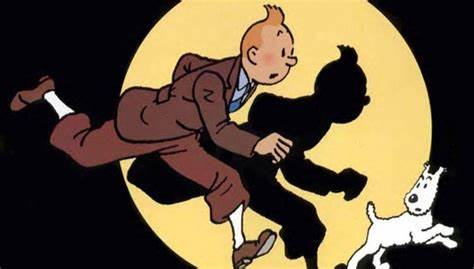

Dostoevsky on into Don Quixote
Remerging myself in Dostoevsky, I am now indulging in Don Quixote. It is a novel Dostoevsky held in such esteem that it is mythologized that he slept with a copy under his pillow. Everything Dostoevsky wrote must be understood with Don Quixote in the background. I have started the novel three or four times throughout my life, yet honestly never finished it. Not sure why as I am always thoroughly engaged. I identify the humor of the story as an essential key to understanding Dostoevsky. Don Quixote is a rip roaring laugh fest. The idea of a crazy elderly gentleman, enflamed by the reading of pulp fiction, ventures out into the world on a heroic (chivalric) quest of valor, conquering evil while defending the good, all in the name of a princess, speaks so loudly to the insanity of our divided world, the demonizing of others, and the need to see oneself as a savior. Enjoy the humor. I love this stuff. Umberto Eco wrote a book ‘Baudolino’ which utilized a similar humor while defining a scandalous liar’s tales.
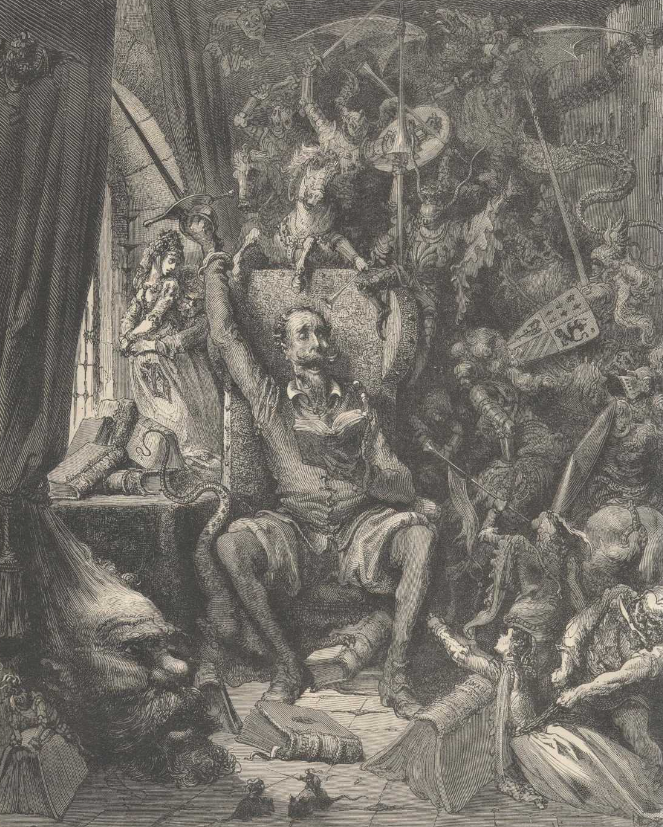
He had not gone far, when out of a thicket on his right there seemed to come feeble cries as of someone in distress, and the instant he heard them he exclaimed, “Thanks be to heaven for the favour it accords me, that it so soon offers me an opportunity of fulfilling the obligation I have undertaken, and gathering the fruit of my ambition. These cries, no doubt, come from some man or woman in want of help, and needing my aid and protection;” and wheeling, he turned Rocinante in the direction whence the cries seemed to proceed. He had gone but a few paces into the wood, when he saw a mare tied to an oak, and tied to another, and stripped from the waist upwards, a youth of about fifteen years of age, from whom the cries came. Nor were they without cause, for a lusty farmer was flogging him with a belt and following up every blow with scoldings and commands, repeating, “Your mouth shut and your eyes open!” while the youth made answer, “I won’t do it again, master mine; by God’s passion I won’t do it again, and I’ll take more care of the flock another time.”
Seeing what was going on, Don Quixote said in an angry voice, “Discourteous knight, it ill becomes you to assail one who cannot defend himself; mount your steed and take your lance” (for there was a lance leaning against the oak to which the mare was tied), “and I will make you know that you are behaving as a coward.” The farmer, seeing before him this figure in full armour brandishing a lance over his head, gave himself up for dead, and made answer meekly, “Sir Knight, this youth that I am chastising is my servant, employed by me to watch a flock of sheep that I have hard by, and he is so careless that I lose one every day, and when I punish him for his carelessness and knavery he says I do it out of niggardliness, to escape paying him the wages I owe him, and before God, and on my soul, he lies.”
************
He now came to a road branching in four directions, and immediately he was reminded of those cross-roads where knights-errant used to stop to consider which road they should take. In imitation of them he halted for a while, and after having deeply considered it, he gave Rocinante his head, submitting his own will to that of his hack, who followed out his first intention, which was to make straight for his own stable. After he had gone about two miles Don Quixote perceived a large party of people, who, as afterwards appeared, were some Toledo traders, on their way to buy silk at Murcia. There were six of them coming along under their sunshades, with four servants mounted, and three muleteers on foot. Scarcely had Don Quixote descried them when the fancy possessed him that this must be some new adventure; and to help him to imitate as far as he could those passages he had read of in his books, here seemed to come one made on purpose, which he resolved to attempt. So with a lofty bearing and determination he fixed himself firmly in his stirrups, got his lance ready, brought his buckler before his breast, and planting himself in the middle of the road, stood waiting the approach of these knights-errant, for such he now considered and held them to be; and when they had come near enough to see and hear, he exclaimed with a haughty gesture, “All the world stand, unless all the world confess that in all the world there is no maiden fairer than the Empress of La Mancha, the peerless Dulcinea del Toboso.”
The traders halted at the sound of this language and the sight of the strange figure that uttered it, and from both figure and language at once guessed the craze of their owner; they wished, however, to learn quietly what was the object of this confession that was demanded of them, and one of them, who was rather fond of a joke and was very sharp-witted, said to him, “Sir Knight, we do not know who this good lady is that you speak of; show her to us, for, if she be of such beauty as you suggest, with all our hearts and without any pressure we will confess the truth that is on your part required of us.”
************
One of the muleteers in attendance, who could not have had much good nature in him, hearing the poor prostrate man blustering in this style, was unable to refrain from giving him an answer on his ribs; and coming up to him he seized his lance, and having broken it in pieces, with one of them he began so to belabour our Don Quixote that, notwithstanding and in spite of his armour, he milled him like a measure of wheat. His masters called out not to lay on so hard and to leave him alone, but the muleteer’s blood was up, and he did not care to drop the game until he had vented the rest of his wrath, and gathering up the remaining fragments of the lance he finished with a discharge upon the unhappy victim, who all through the storm of sticks that rained on him never ceased threatening heaven, and earth, and the brigands, for such they seemed to him. At last the muleteer was tired, and the traders continued their journey, taking with them matter for talk about the poor fellow who had been cudgelled. He when he found himself alone made another effort to rise; but if he was unable when whole and sound, how was he to rise after having been thrashed and well-nigh knocked to pieces? And yet he esteemed himself fortunate, as it seemed to him that this was a regular knight-errant’s mishap, and entirely, he considered, the fault of his horse. However, battered in body as he was, to rise was beyond his power.

T.S. Eliot a piece of Four Quartets
East Coker
I
In my beginning is my end. In succession
Houses rise and fall, crumble, are extended,
Are removed, destroyed, restored, or in their place
Is an open field, or a factory, or a by-pass.
Old stone to new building, old timber to new fires,
Old fires to ashes, and ashes to the earth
Which is already flesh, fur and faeces,
Bone of man and beast, cornstalk and leaf.
Houses live and die: there is a time for building
And a time for living and for generation
And a time for the wind to break the loosened pane
And to shake the wainscot where the field-mouse trots
And to shake the tattered arras woven with a silent motto


Proper prayer concentration
It is an illusion to confine our prayer to one small corner of the day, and afterwards to think no more about it. No doubt it produces at the very time it is made a part of its effect; the mind is enlightened, affections and petitions are made, all which has its own value; but this pious exercise does not yield us all its fruit, unless it results in a practical resolution which corresponds to our needs, and which dwells in the memory in order to be put in practice. A prayer, which does not result in this, is like a remedy that is never applied, an instrument that is never used, a sword that remains in the scabbard.
In fine, it is an illusion to take scrupulosity for delicacy of conscience and its futile pre-occupations for a good prayer. On the contrary, this is one of the greatest obstacles to union with God; an obstacle, because it hinders tranquility of mind and attention to God; an obstacle, because it contracts the heart with sadness, stifles confidence and love, paralyses the will, inclines us to fly from God. Besides, what prayer can there be in a heart tossed about by scruples? Instead of adoring, it is examining its conscience; instead of thanking, it is probing its sores, it asks no pardon, it is too busy investigating its guilt, it begs for no grace, it is too much occupied in self-inspection. It has not then made any prayer, it was too busy with self to have any time to speak to God; or, if it has done so, it was a prayer without confidence, without any expanding of the heart; fear has banished the familiar intercourse of prayer, anxieties have destroyed calm and peace. Scrupulosity is not repentance, it is merely trouble; it is not delicacy of conscience, but its unhealthy counterfeit.
“The Ways of Mental Prayer” written by Rev. Dom Vitalis Lehodey
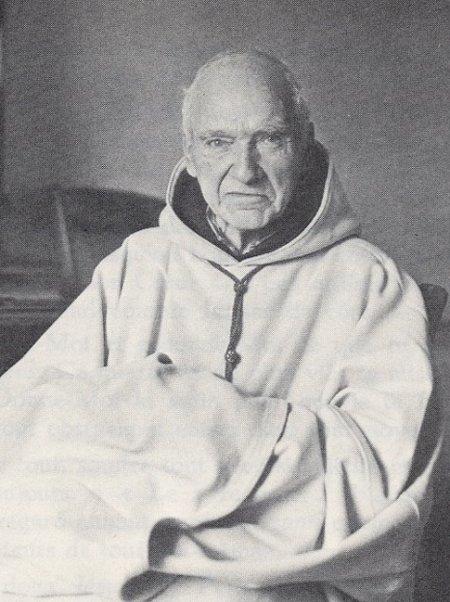
This Cistercian’s writing has always penetrated deep. His voice elevates my aspirations. In my mind, he thrived in the monastic life, an example, a pillar. The monastic life I have always viewed as something set apart.

Savoring
Dangling and brought down,
Amidst the swirling noise,
A cacophony of alarms,
Solitude beyond remains,
A presence,
It stays, lingers,
A heartbeat persevering,
Set aside alone,
Resorting to nothing,
The sound of rain,
No longer terrorizes,
My skin no longer burns,
Teeth no longer gnashing,
Ambitions fade,
Decades pass,
Reflecting, rejecting,
Refusing, renouncing,
Remembering the pain,
Accepting, admitting,
I alone bow before God,
A Mother coddles,
An angel weeps,
Appetites dwindle,
Within last gasp efforts,
Desperate and demanding,
While losing power.

St Teresa of Avila poetry
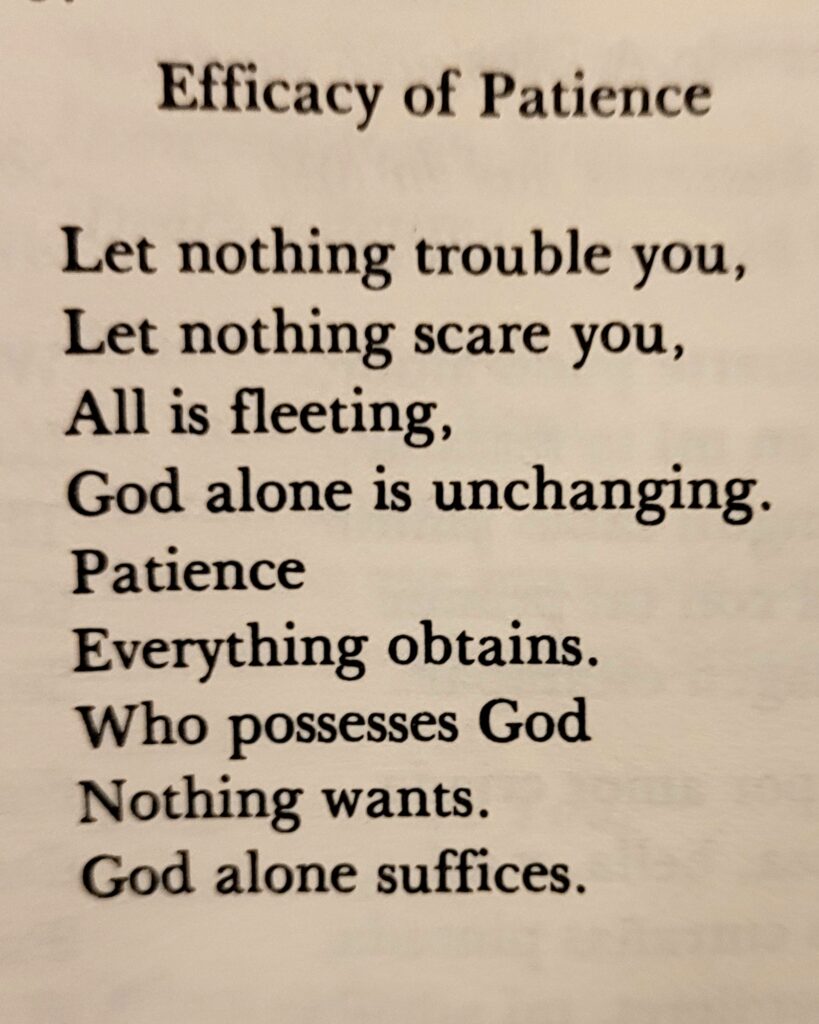


Recent Comments